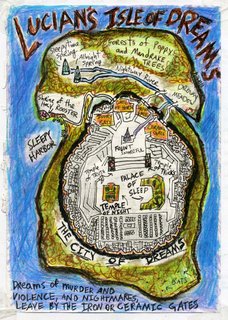Newest book (all words, sorry)...
Friday, July 20, 2012
Tuesday, July 13, 2010
Friday, June 19, 2009
Friday, August 29, 2008
POETS ON PAPER
Works by 5 Poet-Artists
at the Canessa Gallery
September 1-October 1, 2008
Brent Cunningham, Cassandra Smith, Dan Fisher, Scott Inguito & Jared Stanley
Opening Night: Thursday, September 4, 6:30pm-9:00pm
(during "First Thursdays" SF Art Crawl)
Canessa Gallery
708 Montgomery Street
San Francisco, CA 94111
415.392.1768
Works Online:
D. Fisher
C. Smith
J. Stanley
S. Inguito
at the Canessa Gallery
September 1-October 1, 2008
Brent Cunningham, Cassandra Smith, Dan Fisher, Scott Inguito & Jared Stanley
Opening Night: Thursday, September 4, 6:30pm-9:00pm
(during "First Thursdays" SF Art Crawl)
Canessa Gallery
708 Montgomery Street
San Francisco, CA 94111
415.392.1768
Works Online:
D. Fisher
C. Smith
J. Stanley
S. Inguito
Friday, June 13, 2008
Wednesday, January 23, 2008
Even-Scale Series (Notes)
Even-scale is a principle I’ve been developing for use in cartographic art pieces. It began in thoughts about how visual information is usually structured in maps, diagrams, graphs, and other instrumentalist visual arts. Customarily the presentation of any given source data is determined by the supposed legibility of that data to its imagined future “readers.” By contrast, in even-scale the objective is to establish an experiential and/or bodily connection between the mapmaker and the data. The assumption is that a new kind of legibility, directly emblematic of the phenomena, will continue to be perceptible, if only as a by-product.
In practice, the mapmaker tries to find some technique to directly experience the scale of people or quantities being represented. A physical mark made by the mapmaker might represent time, dollars, distance, people, or deaths. Other kinds of alignments are out there to be invented. The ideal is a one-to-one equivalence of some kind, but realistically any equivalence (10 to one, 100 to one) is a sufficient gesture towards even-scale.
In practice, the mapmaker tries to find some technique to directly experience the scale of people or quantities being represented. A physical mark made by the mapmaker might represent time, dollars, distance, people, or deaths. Other kinds of alignments are out there to be invented. The ideal is a one-to-one equivalence of some kind, but realistically any equivalence (10 to one, 100 to one) is a sufficient gesture towards even-scale.
Thursday, August 09, 2007
Wednesday, June 20, 2007
Saturday, May 19, 2007
Monday, April 09, 2007
Tuesday, December 19, 2006
Wednesday, August 09, 2006
Tuesday, August 08, 2006
Tuesday, June 13, 2006
Thursday, May 11, 2006
Diagram #9 (Parts & Operations of the Arrow)
 “Imagine this case: We give someone an order to walk
“Imagine this case: We give someone an order to walkin a certain direction by pointing or by drawing an arrow
which points in the direction. Suppose drawing arrows
is the language in which we generally give such an order.
Couldn’t such an order be interpreted to mean that the man
who gets it is to walk in the direction opposite to that of the arrow?”
--Ludwig Wittgenstein, The Blue Book
(Preliminary Studies for the ‘Philosophical Investigations’)
Thursday, April 13, 2006
Wednesday, March 22, 2006
Diagram #7 (Lucian's Isle of Dreams)

Lucian of Syria (c. 125 A.D.- c. 190 A.D.)
from A True Story (trans. Lionel Casson):
"There were dreams with wings, freakish dreams, and dreams which, dressed up like kings, queens, gods, and the like, looked as if they were going to a carnival. Many we recognized because we had seen them long ago. These actually came up and greeted us like old friends, then invited us into their homes and, putting us to sleep, extended us the warmest and most generous hospitality..."
Tuesday, February 28, 2006
Wednesday, February 01, 2006
Thursday, January 19, 2006
Monday, January 09, 2006
Monday, December 19, 2005
Diagram #2 (Campanella's City of the Sun)
Friday, December 09, 2005
Wednesday, November 16, 2005

Bird & Forest
Ugly Duckling Press, 2005
ISBN: 1-933254-06-8
Available through:
Ugly Duckling
or
Small Press Distribution
"Bird & Forest is clear, beautiful writing. There is a simple quality of the well-told-tale to these fractured fables. This is a patient, wise and hilarious work whose intimate tone insinuates itself into your psyche only to have its way with you and then suddenly vanish. What more could you want?"--Laura Moriarty.
"With orations, fables, axioms, proofs, journals, and letters, Brent Cunningham offers a riposte to the confounding realities of empire just when we need it most. The repeated 'awakenings' of Bird & Forest suggest the wonder of conversion narrative without the ideological baggage. Engaging myriad rhetorical 'types,' he exhausts their function to disclose the backstory of creation, romantic love, and the curious permanence of warfare while gorgeously demonstrating the resilience of the imagination."--Peter Gizzi.
Subscribe to:
Comments (Atom)

























